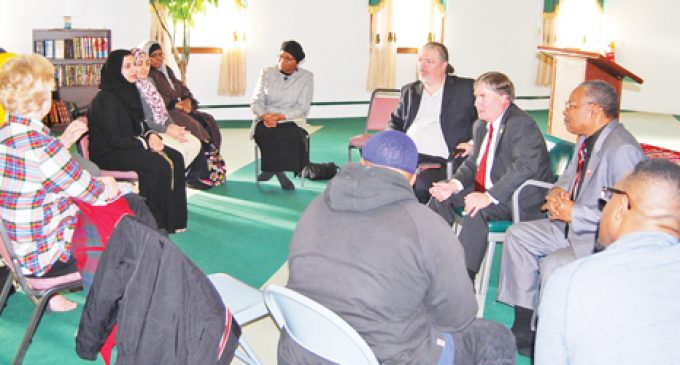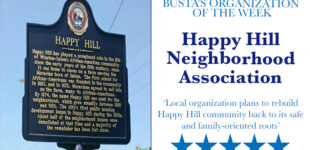Mosque Q&A features Justice Ervin

(Justice Ervin fields a question from an attendee.)
Newly-elected North Carolina Supreme Court Justice Sam J. Ervin IV visited the Community Mosque in Winston-Salem last Friday for You be the Judge, a series that brings elected officials face-to-face with those they serve.
Ervin, who was elected last November and sworn in on Jan. 7, gingerly addressed a variety of questions on topics like police accountability, campaign financing and Sharia law (where Islam dictates moral conduct). He and the dozen or so attendees sat in chairs arranged in a circle. Attendees ranged in age from seasoned community activists to Salem College students, including one who asked why Ervin came. Ervin said he likes to talk to constituents whenever he can, in hopes of “making the court system a bit less mysterious than it is.”
“I think one of the important jobs of any public official, and I think this is particularly true of judges, is to get out and take advantage of opportunities that come up to try to do a better job of explaining what it is that we do, who we are and, to the extent that we legally can, why we function the way we function,” said Ervin, the son of the late U.S. Federal Judge Sam Ervin III and the grandson of the late U.S. Senator Sam Ervin, whose work on Senate committees exposed the corruption of Joseph McCarthy and later Richard Nixon.
Winston-Salem State University Professor Jinaki Abdullah brought up the recent grand jury verdicts that let white police officers go unpunished after they took the lives of unarmed black men.
 “Is justice for sale?” she asked. “Are we getting equitable treatment for everyone in America?”
“Is justice for sale?” she asked. “Are we getting equitable treatment for everyone in America?”
Ervin called the law an imperfect instrument in a court system run by people who are fallible. He compared it to soccer games he’s refereed where various people see the same thing, but interpret it completely differently.
He said he has found there’s a lack of communication between the police and the community. There needs to be people of goodwill on both sides to try to talk and understand each others’ points of view, he said.
“Hopefully, the tragic sets of circumstances that have happened around the country can at least cause everybody to step back to give others the benefit of the doubt on both sides rather than just to assume, or folks to assume, that law enforcement is enviably out to do things that they shouldn’t. And the law enforcement officers should make sure that they’re not making unfounded assumptions about the people with whom they interact,” he said.
Community activist Anne Wilson asked about money in politics, including the Citizens United Supreme Court decision, which ruled the government cannot restrict political expenditures from nonprofit corporations because it is a form of free speech.
“I’m concerned about the courts having been bought in many respects,” she said. “Citizens United is one of the worst things that have happened to our country. The monies being poured into judicial races is a great concern of mine.”
Ervin said it’s a question he’s asked a lot. He attributes his 2012 loss for a Supreme Court seat to the $3.5 million spent by out-of-state groups in support of his opponent; he ran a publicly-financed campaign.
In his 2014 campaign, which happened after public financing of judicial campaigns ended, he raised $680,000, which he said is close to a record for an Associate Justice campaign. He said the appearance of the money in the races bothers him, but he’s reluctant to endorse an amendment to the U.S. Constitution to limit campaign spending for fear of what other changes might be made.
“I’m always nervous about attempts to amend the First Amendment because there are so many people who would like to make changes to the Bill of Rights in such ways that favor their particular interest,” he said.
Ervin was also asked his opinion of the General Assembly’s actions on Sharia, or Islamic law. In 2013, North Carolina became the seventh state to ban Sharia, which is observed in some Islamic countries. A Sharia ban in Oklahoma was found unconstitutional in court because it only targeted a specific religion. The North Carolina law, sponsored by Republican lawmakers and allowed to become law by the governor without his signature, attempts to avoid that by banning the use of all international laws in family cases. Supporters maintain it’s meant to safeguard the Constitution, while detractors say it’s just an attempt to stoke fear of Muslims.
Ervin declined to give his opinion on the matter since it might come before the state Supreme Court.
“I have pretty consistently, religiously, refrained from commenting on what the General Assembly ought to do in any particular case for fear that somebody might not think I could apply that law properly if its constitutional or determine its constitutionality fairly if a challenge is launched,” he said.
Fleming El-Amin and Shawn Spilman are the organizers behind the You be the Judge series. Last Fall, before the General Election, a similar forum featuring many candidates was held at the mosque. Ervin could not make that event but vowed to take part in a make-good sit down. He fulfilled that promise with last week’s appearance, said El-Amin, a member of the local Board of Elections and Mid-Atlantic regional coordinator for American Coalition for Good Government.
Americans United will hold a public discussion on how the Sharia ban is impacting the Islamic community on Tuesday, Jan. 27 at Polo Recreation Center at 7 p.m., El-Amin said.
















